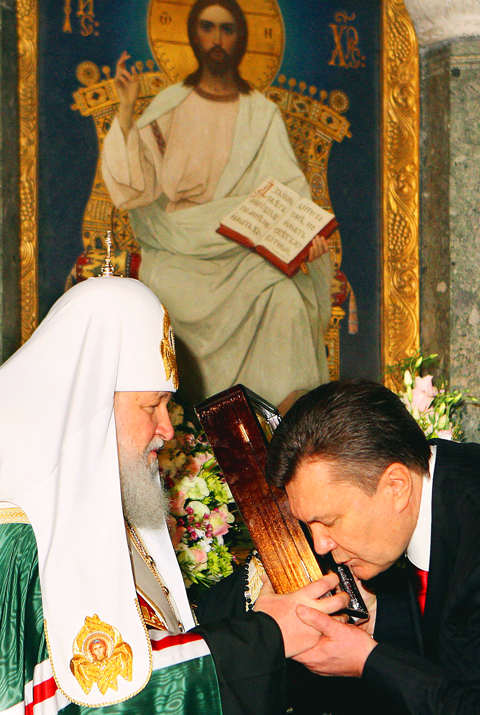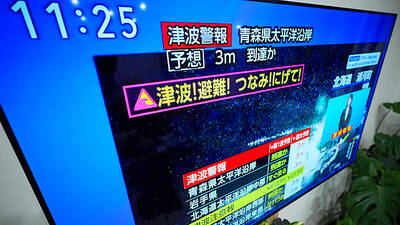Ukrainian president-elect Viktor Yanukovych took the oath of office yesterday in a low-key ceremony reflecting a bitterly fought and disputed election that has highlighted deep divisions in the country.
The inauguration of Yanukovych, 59, marks a comeback from humiliation five years ago when mass protests, called the Orange Revolution, overturned an election that had been rigged in his favor.
Yesterday’s ceremony in Ukraine’s parliament, however, still had a hollow ring to it.

PHOTO: AFP
Yanukovych beat Ukrainian Prime Minister Yulia Tymoshenko by 3.5 percentage points in a Feb. 7 run-off, but won the support of only a third of the 37 million-strong electorate and will be the first president of Ukraine to have been supported by less than 50 percent of those who voted.
The voting pattern highlighted a sharp split between Russian-speaking voters in the industrial east and south who backed Yanukovych, and Ukrainian speakers in the west and center who voted for Tymoshenko.
Tymoshenko, who only last Saturday dropped a legal challenge to Yanukovych’s election and still maintains his victory was not legitimate, may boycott the ceremony.
She is resisting attempts to oust her as prime minister, signaling continued political tension in the ex-Soviet state of 46 million, at least in the short term.
Yanukovych, a stocky former mechanic who had a deprived childhood in eastern Ukraine and as a young man was convicted twice for petty crime including assault, is expected to tilt the country back toward Moscow after estrangement under the outgoing pro-Western Ukrainian president Viktor Yushchenko.
He has hinted at possible concessions to Moscow over the future of Russia’s Black Sea fleet forces in Ukraine’s Crimean peninsula and has proposed the creation of a consortium including Russia to run the country’s gas pipelines.
He said, however, that he wanted to change a 10-year-old agreement on supplies of Russian gas to Ukraine, which was negotiated by Tymoshenko and Russian Prime Minister Vladimir Putin.
He will push Yushchenko’s drive for NATO membership onto the back-burner. He said, however, that he would pursue a balanced foreign policy and has vowed to push for closer ties with the EU.
Though there is little appetite in the EU to take on Ukraine as a member, EU sources said Yanukovych would travel to Brussels on Monday on his first visit abroad. Yanukovych’s Regions Party and the Kremlin have said he would visit Moscow early next month.
Ukraine’s economy was hit hard by the global downturn and is dependent on a US$16.4 billion IMF bail-out program. IMF lending was suspended late last year and is only likely to resume when stability returns.
Yanukovych’s immediate task will be to deliver on a promise to make life better for Ukrainians and for that he needs a prime minister with whom he can work.
He has already mooted three candidates to replace Tymoshenko — businessman and former central bank chief Sergey Tigipko, former foreign minister and parliament speaker Arseniy Yatsenyuk and former finance minister Mykola Azarov.
Tymoshenko is seeking to persuade her parliamentary allies to close ranks round her, while Yushchenko’s party and its powerful backers, many of them wealthy industrialists, are seeking to draw deputies away from her coalition and forge a new one to get her out.

PARLIAMENT CHAOS: Police forcibly removed Brazilian Deputy Glauber Braga after he called the legislation part of a ‘coup offensive’ and occupied the speaker’s chair Brazil’s lower house of Congress early yesterday approved a bill that could slash former Brazilian president Jair Bolsonaro’s prison sentence for plotting a coup, after efforts by a lawmaker to disrupt the proceedings sparked chaos in parliament. Bolsonaro has been serving a 27-year term since last month after his conviction for a scheme to stop Brazilian President Luiz Inacio Lula da Silva from taking office after the 2022 election. Lawmakers had been discussing a bill that would significantly reduce sentences for several crimes, including attempting a coup d’etat — opening up the prospect that Bolsonaro, 70, could have his sentence cut to

A powerful magnitude 7.6 earthquake shook Japan’s northeast region late on Monday, prompting tsunami warnings and orders for residents to evacuate. A tsunami as high as three metres (10 feet) could hit Japan’s northeastern coast after an earthquake with an estimated magnitude of 7.6 occurred offshore at 11:15 p.m. (1415 GMT), the Japan Meteorological Agency (JMA) said. Tsunami warnings were issued for the prefectures of Hokkaido, Aomori and Iwate, and a tsunami of 40cm had been observed at Aomori’s Mutsu Ogawara and Hokkaido’s Urakawa ports before midnight, JMA said. The epicentre of the quake was 80 km (50 miles) off the coast of

China yesterday held a low-key memorial ceremony for the 1937 Nanjing Massacre, with Chinese President Xi Jinping (習近平) not attending, despite a diplomatic crisis between Beijing and Tokyo over Taiwan. Beijing has raged at Tokyo since Japanese Prime Minister Sanae Takaichi last month said that a hypothetical Chinese attack on Taiwan could trigger a military response from Japan. China and Japan have long sparred over their painful history. China consistently reminds its people of the 1937 Nanjing Massacre, in which it says Japanese troops killed 300,000 people in what was then its capital. A post-World War II Allied tribunal put the death toll

A passerby could hear the cacophony from miles away in the Argentine capital, the unmistakable sound of 2,397 dogs barking — and breaking the unofficial world record for the largest-ever gathering of golden retrievers. Excitement pulsed through Bosques de Palermo, a sprawling park in Buenos Aires, as golden retriever-owners from all over Argentina transformed the park’s grassy expanse into a sea of bright yellow fur. Dog owners of all ages, their clothes covered in dog hair and stained with slobber, plopped down on picnic blankets with their beloved goldens to take in the surreal sight of so many other, exceptionally similar-looking ones.